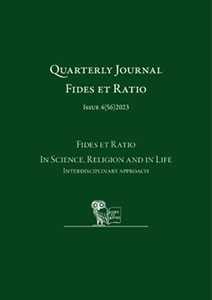Abstract
Both St. Thomas Aquinas and St. John Paul II regarded man’s pursuit of truth as his vocation. He encouraged a bold trust in the use of reason in theology and a clear awareness of the limitations of reason. The fact that reason cannot prove faith does not render it powerless; on the contrary, Thomas provides evidence for unwavering confidence in the capacity of the believing reason. The call to seek faith and reason in unity with truth is not easy, as culture has seen deficiencies and errors regarding the truth about man, his faith, and the possibilities of knowledge that reach down to the very foundation. There is a continuous need to rediscover the meaning and purpose of human life and its values, through the belief in the possibility of truth attained through reason and through reasonable faith. Following in the footsteps of Thomas, John Paul II, in his encyclical Fides et Ratio, aims to inspire human love for the embrace of truth, which is not purely a theoretical goal but is essential for guiding one’s life. The purpose of this article is to highlight various difficulties and solutions in the search for coherence between faith and reason and briefly signal the necessity of prior knowledge and application of metaphysical and anthropological theology. To achieve this goal, the thoughts of Saint Thomas, whose work constitutes a fundamental part of the Church’s teaching, are presented, and for the reinforcement of Thomistic arguments, the content of Pope John Paul II’s contemporary encyclical Fides et Ratio is utilized, which points to the writings of Thomas as helpful in the maturation of human knowledge toward full human wisdom. Another important message of the article is a better understanding of the issues discussed, which, when reinterpreted and from the abundance of content, appropriately justified, can regain their lost power. The structure of the article facilitates the analysis of the presented issue in the context of understanding integral anthropology.
References
Benedykt XVI, (2010). Katecheza podczas audiencji generalnej dn. 2.06.2010, O’Osservatore Romano, 8/9/2010. (From:) https://opoka.org.pl/biblioteka/W/WP/benedykt_xvi/audiencje/ag_02062010.html (access: 03.09.2023).
Chesterton, G.K. (1959). Tomasz z Akwinu. Warszawa: Instytut Wydawniczy PAX.
Chrostowski, W. (2003). Dyskusja panelowa wokół Fides et Ratio: Instytut Nauk Religijnych im. św. Tomasza z Akwinu, Kijów, 29 III 2003. Collectanea Theologica, 73(3), 217-220.
Dekret o formacji kapłańskiej, Optatam Totius, Sobór Watykański II, (1965). Rzym.
Gałuszka, T. (2021). Piękny Bóg, piękny człowiek. Poznań: Wyd. W Drodze.
Giertych, W. (2012). Fides et actio. Warszawa: Wyd. Księży Marianów PROMIC
Grochowska, I. (2018). Mądrość w drodze do prawdy. Koncepcja mądrości na podstawie Summy contra gentiles Tomasza z Akwinu. Kwartalnik Naukowy Fides et Ratio 36(4), 109-123.
John Paul II, (1998). Encyklika Fides et Ratio. Watykan.
Katechizm Kościoła Katolickiego, (1994). Poznań: Wydawnictwo Pallotinum.
Krąpiec, M.A., Wiara. (In:) Powszechna Encyklopedia filozofii. (From:) http://www.ptta.pl/pef/pdf/w/wiara.pdf (access: 03.09.2023).
Krokos, J. (2009). Racjonalność chrześcijaństwa. (In:) J. Krokos, M. Ryś (eds.), Czy rozum jest w konflikcie z wiarą. W X rocznicę ogłoszenia encykliki Fides et Ratio, 39-55. Warszawa: Instytut Papieża Jana Pawła II.
Legge, D. (2016). The Influences of the Dominican Order in the Middle Ages. Angelicum. Pontificia Studiorum Universitas a Sancto Thomas Aquinate in Urbe, 93(2). (From:) https://www.jstor.org/stable/e26392553, (access: 03.09.2023).
Levering, M. (2016). Pismo Święte i metafizyka Tomasza z Akwinu i odnowa teologii trynitarnej. Kraków: Dominikańska Biblioteka Teologii.
Pismo Święte Starego i Nowego Testamentu, (1982). Poznań – Warszawa: Wydawnictwo Pallotinum.
Przanowski, M. (2015). Powołanie chrześcijańskiego mędrca. (In:) M. Przanowski (ed.), Tomasz z Akwinu o Bogu, Studia Teologiczne, 28-51. Warszawa: Instytut Tomistyczny.
Ratzinger, J. (2015). Głód Boga. Kazania z Pentling. Kraków: Wydawnictwo WAM.
Shanley, B. (2017). Tradycja Tomistyczna, t. VI. Warszawa: Instytut Tomistyczny.
Sokołowski, R. (2015). Bóg wiary i rozumu. Podstawy chrześcijańskiej teologii. Kraków: Dominikańska Biblioteka Teologii.
Solecka-Karczewska, I. (2015). Zgodność rozumu i wiary w „Summa theologiae” Tomasza z Akwinu. Rocznik Tomistyczny, 4, 145-161.
Swieżawski, S. (1995). Tomasz na nowo odczytany. Poznań: Wydawnictwo W Drodze.
Thomas Aquinas, (1960). Suma Teologiczna. Londyn: Katolicki Ośrodek Wydawniczy „Veritas”.
Thomas Aquinas, (1998a). Kwestie dyskutowane o prawdzie (De veritate). Kęty: Wydawnictwo Antyk.
Thomas Aquinas, (1998b). Traktat o człowieku, Summa Teologii. Kęty: Wydawnictwo Antyk.
Thomas Aquinas, (2003). Summa contra gentiles. Prawda wiary chrześcijańskiej, t. I. Poznań: Wydawnictwo W Drodze.
Thomas Aquinas, (2018). Dysputa o prawdzie. Dysputy problemowe o prawdzie. Kwestia 1. A. Białek (transl.), M.A. Krąpiec, A. Maryniarczyk (acceptance of the translation), Lublin: Polskie Towarzystwo Tomasza z Akwinu.
Thomas Aquinas, (2019). Wykład pacierza. Poznań: Wydawnictwo W Drodze.
Thomas Aquinas, (2023). Kwestie Quodlibetalne. Poznań: Wydawnictwo W Drodze.
Torrell, J-P. (2003). Tomasz z Akwinu Mistrz duchowy. Poznań: Wydawnictwo W Drodze.
Torrell, J-P. (2008). Tomasz z Akwinu – Człowiek i dzieło. Warszawa: Instytut Tomistyczny.
Włodek, Z. (2007). Wprowadzenie do Tomasza z Akwinu, Summa contra gentiles. Prawda wiary chrześcijańskiej. Poznań: Wydawnictwo W Drodze.
Zdybicka, Z. (1999). Antropologiczny kontekst problematyki Boga w Fides et Ratio. Człowiek w Kulturze, 12, 191-208.

